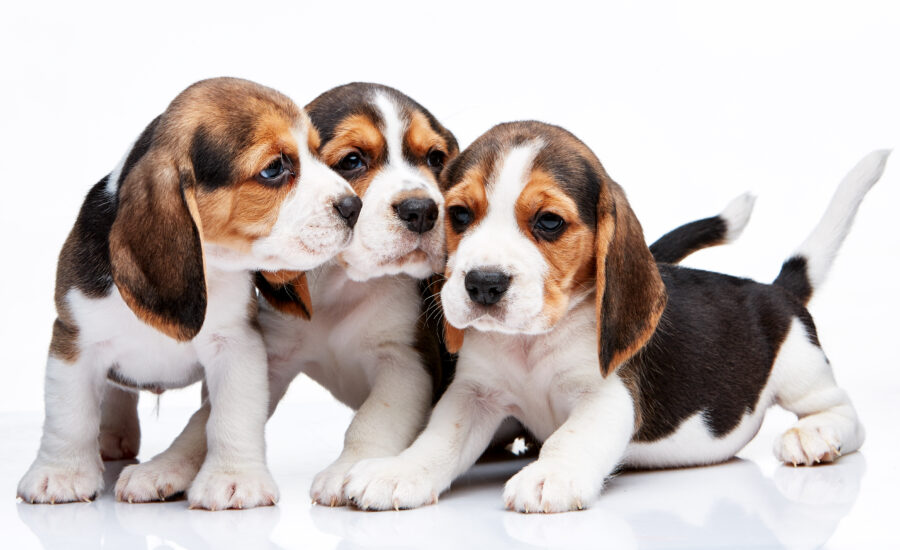When and how often should I feed my puppy?
From when you bring your puppy home at eight weeks until they are four months old, it’s best to feed them four meals a day. At four months, reduce this to three meals a day and when they turn six months, reduce to two meals. Continue a morning and evening meal for your pup’s life.
When you choose to feed your pup their meals is up to you, but we recommend spacing out meals evenly throughout the day. Remaining consistent will help get them into a routine, which will make life easier for you and them. We also recommend avoiding strenuous exercise after eating, which can lead to vomiting and potentially bloat.
You may have read that people should always eat their dinner before the family pet gets theirs – this comes from a very outdated concept of dog behaviour and is based on the now-debunked idea that you need to show your dog who is boss (sometimes called the ‘pack leader’ or ‘alpha’). While it is important to teach your dog good manners around food so they are well-behaved and don’t eat things that could cause them harm, your puppy isn’t planning a household takeover! What’s more important to a puppy is routine and consistency, as this will ensure they understand what you expect of them and grow into a confident dog who trusts you. Feeding your pet at the same time each day will help get them into a routine, and ensuring everyone in the family consistently sticks to any doggy rules you decide upon (for eg no titbits from the table) will help your pup to understand what you’re asking of them more quickly.
Where should I feed my puppy?
Find a quiet spot where your pup can chow down in peace and won’t be disturbed by other pets, children or adults. We recommend feeding your new puppy away from any other household pets until they’re all used to each other and won’t be tempted to pinch each other’s dinner!
Does my puppy need ‘puppy’ food?
Puppies have growing bodies and so have different nutritional needs to fully grown dogs. We recommend feeding your pup a labelled puppy food until they are around a year old (or as advised by your vet) before moving them on to an adult food. Your vet may recommend feeding a large or giant breed puppy food for longer than a year.
Help! My puppy is a quick eater
Some dogs just love their food and will hoover it up in no time at all. If your pup is one of them, it’s a good idea to invest in a way of slowing them down. This could be through stuffing their meal into a Kong so they have to eat it slowly, or using a puzzle bowl which makes it trickier to get to the food in as quick a time and so slows them down.
Some breeds (usually large or giant breed dogs) are more susceptible to a condition called bloat, where the stomach fills with gas and flips, cutting of the blood supply. It’s a very serious and potentially life-threatening illness and veterinary attention should be sought immediately. Bloat can be brought on by eating too quickly, so for these breeds in particular we recommend using a slow feeding bowl.
Activity feeding
One way to make meal times more fun and get your pup’s brain working is to use an activity feeder. These are brilliant for dogs throughout all stages of life, but will help your pup in a number of ways, including slowing down speedy eaters (see above), directing the urge to chew away from your furniture and into something you’re happy for them to sink their teeth into, motivating youngsters who are picky about their food, and keeping them calm and occupied when you’d like them to be.
Do make sure to choose an activity/puzzle feeder that is suitable for your puppy’s level of understanding. Some toys such as treat balls are trickier to master than other for a novice puppy, and if your pup has difficulty reaching the food they could become frustrated which could lead to problems around food. Start your pup off with something like a Kong or a slow feed bowl where the food is easy to get out. Once they’re happy with this you can move them onto types that require more brain power.

